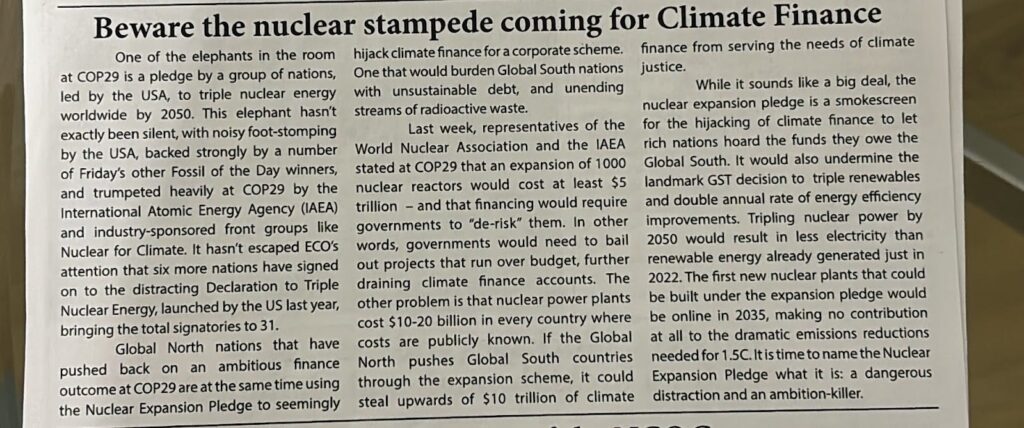Author: The Kernel & Vladislav
Last week, an article circulated in ECO—the daily newsletter published by the Climate Action Network (CAN) at COP29—warning of a “nuclear stampede” threatening climate finance. For those unfamiliar, CAN is a global network of over 1,500 environmental NGOs working to promote government and individual action to address climate change. While we at Generation Atomic appreciate the concerns raised, we couldn’t help but chuckle. If there’s an elephant in the room, perhaps it’s time we acknowledged that this elephant might just help carry us toward our climate goals, rather than trample over them.

It’s no secret that nuclear energy has been making a grand entrance at COPs in recent years. Last year, it even earned a mention in the Global Stocktake text—a milestone we celebrated as a step toward a more inclusive and comprehensive climate dialogue. As nuclear energy becomes a more prominent topic, we welcome the increased scrutiny and debate. After all, informed decisions are made through open discussion, not by ignoring the elephant because we’re afraid it might make a mess.
The ECO article raises concerns about the costs and risks associated with expanding nuclear energy, especially in developing countries. Let’s unpack some of these points with a dose of reality.
Firstly, the assertion that tripling nuclear energy by 2050 would cost $5 trillion sounds hefty—until you consider the scale of investment required for any serious global decarbonization effort. According to the International Energy Agency (IEA), reaching net-zero emissions by 2050 will require over $4 trillion in annual clean energy investments by 2030 across all technologies. In this context, nuclear energy is just one piece of a very large puzzle.
Moreover, labeling nuclear energy initiatives as “corporate schemes” while overlooking that renewable energy projects are also developed by corporations seeking profits seems a bit disingenuous. If it’s acceptable for renewable companies to earn profits in the pursuit of clean energy, why is it considered a cash grab when nuclear companies aim to do the same? Such double standards hinder constructive dialogue and distract from our shared goal of combating climate change.
Furthermore, the fear that nuclear energy will burden the Global South with unsustainable debt overlooks the importance of how climate finance is structured. The level of debt and type of financial support provided to developing countries depend on the ambition and design of the New Collective Quantified Goal (NCQG), not on the specific technology chosen. If the NCQG promotes high concessional loans and grants, these can be applied to various clean energy sources—including nuclear—according to each country’s mitigation needs.
It’s essential to remember that Article 9.3 of the Paris Agreement emphasizes that climate finance should take into account the needs and priorities of developing countries. This means supporting a tech-neutral approach that allows countries to decide what’s in their best interest, informed by science and their unique circumstances.
Nuclear energy offers several advantages that are particularly relevant for developing countries. Its low operational costs mean that, once the initial investment is made (potentially with the help of developed nations), countries can enjoy stable, low-cost energy for decades without ongoing financial dependence. Nuclear power has one of the lowest operating costs among energy sources. Additionally, nuclear power provides a reliable baseload supply, contributing to energy stability and supporting economic development.
Let’s not forget about the supply chain benefits. Nuclear energy requires significantly fewer raw materials than many other energy sources, leading to less mining and fewer environmental impacts. Uranium, the fuel for nuclear reactors, is widely available and highly energy-dense. This allows countries to stockpile fuel, enhancing resilience against geopolitical shocks—a lesson we’ve learned all too well in recent times.
Furthermore, nuclear energy projects can stimulate local economies by creating a diverse range of high-quality, well-paid jobs and fostering the development of local expertise and human capital. And contrary to some fears, the nuclear industry maintains strict safety and environmental standards, reducing human rights violations and ensuring a responsible supply chain.
As for the concern that nuclear energy won’t contribute to emissions reductions until 2035, we’d like to point out that planning for the long term is crucial. Climate change isn’t a problem with a quick fix, and we need solutions that will sustain us for the decades to come. Besides, advanced nuclear technologies, such as small modular reactors (SMRs), are on the horizon and promise shorter construction times and lower upfront costs.
In conclusion, we appreciate and fully align with the call for climate justice. Therefore, let’s engage in an open, transparent, and constructive discussion, free from preconceived biases. Nuclear energy isn’t a dangerous distraction; it’s a valuable tool in our collective effort to address climate change. By keeping the door open to all clean energy options, we empower countries to build a sustainable and equitable future.
After all, isn’t it better to invite the elephant to the table rather than pretend it’s not there?


